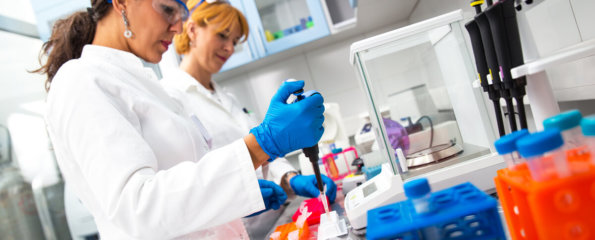Blood cancer patients benefit from breakthrough genetic testing service
Cutting-edge DNA sequencing technology has been used by Queensland University of Technology (QUT) researchers at the new Australian Translational Genomics Centre (ATGC) to identify genetic mutations in 100 patients with blood cancers, with this testing providing clinically important information to doctors about prognosis and likely treatment responses for the majority of patients.
Launched in July 2017, the ATGC was established by QUT researchers in partnership with Pathology Queensland and Metro South Hospital and Health Service to bring research capability into clinical practice to benefit cancer patients and enable personalised treatment therapies.
It is the first genomic diagnostic service in Queensland to provide for cancer patients whole-exome sequencing, a comprehensive, next-generation DNA sequencing method.
QUT Director of Genomics and ATGC Director, Distinguished Professor Matt Brown, said after completing testing on 100 blood cancer patients, the ATGC conducted an analysis of the outcomes.
Led by QUT Associate Professor Paul Leo, the ATGC’s chief bioinformatician, the analysis found that for 75 percent of patients the genetic mutations that were identified could inform doctors about how the patients would respond to particular treatments for their cancers, allowing personalised treatment to improve patient outcomes and avoid procedures not likely to be effective.
In addition, he said, in 60 percent of all the blood cancer patients tested, clinically informative genetic mutations were identified that had not been picked up by current standard genetic testing.
Professor Brown said the results show the benefit of next-generation DNA sequencing testing for blood cancers, such as leukaemia, lymphoma and myeloma, which are the third largest cause of cancer deaths in Australia, claiming more lives each year than breast cancer or skin cancer.
Associate Professor Paula Marlton, Head of Leukaemia and Lymphoma Services at Brisbane’s Princess Alexandra Hospital where the ATGC is based, said an example of where this new diagnostic information was being applied was in leukaemia treatment.
“Increasingly we are able to use the additional information provided by the genomic sequencing of an individual patient’s leukaemia to help us determine whether that patient needs a bone marrow transplant or not,” she said.
Professor Brown said it was pleasing to see research capabilities helping to transform healthcare for cancer patients.
“Queensland already has outstanding clinical services for blood cancer patients, and our testing has given these expert clinicians guidance as to how to provide the best possible treatment for blood cancer patients in three out of four patients tested,” he said.
“We hope to see this testing available to all blood cancer patients in our state.”
The ATGC conducts next-generation sequencing pathology, including whole-exome and whole-genome DNA sequencing and RNA sequencing, and has performed clinical tests on about 500 patients with a range of cancers.
(Source: Queensland University of Technology)
Dates
Tags
Created by:

 Login
Login














